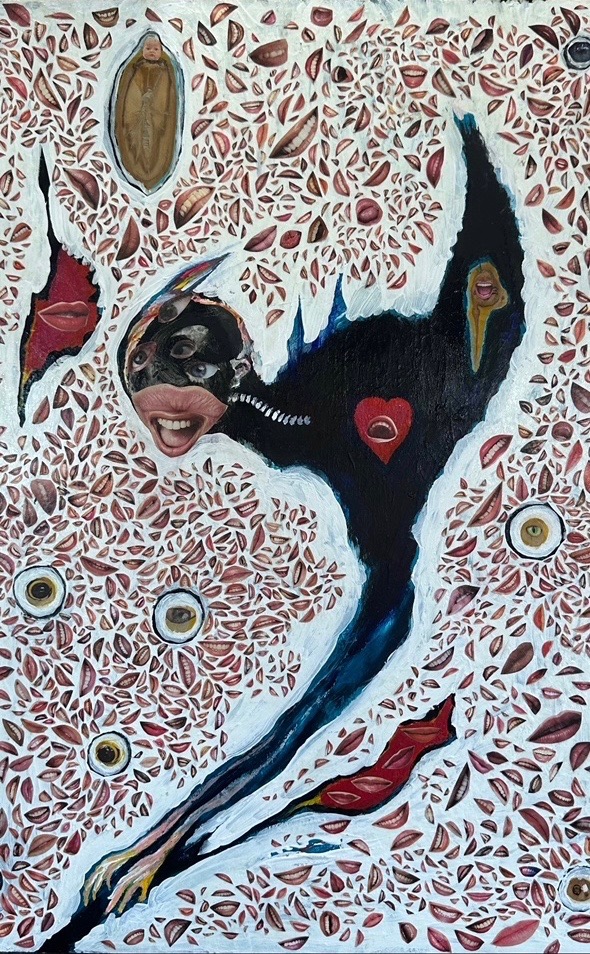Sort of a Christmas Story
By Bucky McMahon
No one at the Christmas party seemed particularly interested when Bird brought up Jakob von Uexküll’s insight into the mind of the tick. The tick? people said to Bird, eyebrows raised, shoulders turning ever so slightly towards an exit. Are we talking ticks? I wouldn’t think a tick had much of a mind. Exactly! Bird said. As von Uexküll pointed out, the tick’s simple sensory apparatus recognizes only three aspects of the physical world: a sensitivity to sunlight which leads it to the top of a blade of grass; the smell of butyric acid from the sebaceous follicles of mammals, which tells it when to let go and fall; and the heat of blood which guides it through the hair to its dinner. In von Uexküll’s theory that’s the tick’s umwelt—it’s self-world—the specific way in which it is embedded in the umgebung, the otherwise unknowable reality which surrounds us all. Though surrounding isn’t quite accurate…
Bird with his monomania was like a sheep dog herding the partygoers. He had chased everyone off the patio, even cleared the kitchen of all except the hostess who was fussing with something in the oven while Bird made it all the way from the reptile brain to the neo-Platonists and their quasi-scientific attempts to lure the umgebung into focus through the creative imagination and alchemy. Alas, she excused herself, bearing away a steaming platter, before Bird got to the point, as he saw it, of Christmas as an incursion, a slice in the veil, a surgical strike, you might say, from the umgebung—mythically speaking, of course. The Massacre of the Innocents, that was the opening chord.
Even in his peculiar umwelt, Bird was not unaware of this anti-charismatic effect, the smiles and whispers he detected as he slowly maneuvered through the clusters of conversations in the living room, careful now to appear to be headed somewhere though never arriving, an exhausting deception. He was aware as well that most of the people at the party—neighbors he had known or at least seen for some years—knew about his accident. The scars on his face were still livid. People were politely solicitous of his health, but cautious of probing too deeply, assuming he wouldn’t want to relive the event in narrative. Of that they were mistaken.
Bird checked his watch again. Forty minutes. He had exceeded his goal; he could make his excuses to the hosts. He was anxious to get back to his studies. Soon he was out the door and walking under the night sky, where he felt most comfortable. Since the accident, he had not liked to be confined by walls, or under a roof. Rather like the tick, he supposed, at the tip of its blade of grass. Bird was quite capable, with a new-found primitive patience, of waiting for a scent, a wafted whiff of his quarry, the umgebung. After six months, though, he had to admit, the vision was slipping away.
Bird had been driving home from the community college where he taught Greek mythology when the driver of a city utilities truck had suffered a stroke and swerved into his lane. Bird had but an instant to adjust his umwelt to this new reality of a truck in his path. He recalled a complete cardiovascular recoil, a tucking in within, as of a turtle into its shell. Bird’s seat belt was buckled, but the windshield came to him as the front of his Corolla collapsed. He should’ve lost consciousness immediately, but that wasn’t the way he remembered it. He remembered travelling onward through something seemingly as solid as granite, yet somehow porous enough to admit his cranium. As if passing through a pasta maker, Bird was extruded in a million discrete noodles, yet was still somehow himself, though on the brink of some ultimate dispersal. Simultaneously, his spine had seemed to roll up—that was the only way he could describe it–from his coccyx to his brainstem. This had hurt, both physically and metaphysically. He had recalled in the moment—funny thing, the mind–a Tinker Toy winch he had made as a child, the long green sticks stuck into a spool. It was as if he had swallowed the thing and it was rolling up through him, intolerably, before winking out of existence like the Ouroboros, the snake that swallows its tail. And that was it. The passage through stone. The Tinker Toy. And then he was there.
Oh, the age of the place. The terrible age! A sphinx, a pyramid, was like a snowflake there. What was Bird in such a place but insignificant atoms, sentient confetti blown about in dry gusts on a blood-red plain. Ancient and familiar, homey and not. Freud’s uncanny, the unheimlicht, had some handle on it. Bird felt—he grieved–all the way back, through father and mother, and all the generations of man and beast, smelled them, the sex and blood and fur of kin. Something stank, oddly and intimately, of tooth decay, as if he were lodged in the molars of Leviathan. And the shame. He could’ve wept for it. But why? For what? The trespass? He was not allowed to be there. Not as himself. The self had to go. Yet surrendering it was like abandoning a helpless child to wolves. He felt the hostility personified, for the umgebung was not unpopulated. Swift and bladelike, that was the best he could do to describe the denizens, like the epiphanic Apollo. Hateful flayers of men. Though maybe not. Maybe not entirely. After all, they let him go home—let him off with a warning, so to speak–whatever they were. They were not people. Far from it.
Bird had been elated to awaken 48 hours later in a hospital bed, with a pounding headache. He smiled at Beth, his wife of thirty-five years, who was dozing over a magazine under a halo of lamplight, and then closed his eyes. When he opened them again, more than a week had passed, and Beth, who had died years ago, had been reabsorbed into the umgebung. Her hallucinatory presence had given him the will to live, a thrillingly diabolical trick. With this second awakening, the pain was more severe and diffuse, though pulsing specifically from a shattered index finger, elaborately bandaged and pinned, which seemed to be pointing to that other world. Later still, he felt listless and depressed. Crushed was the word. Quite naturally, the doctors said; he had suffered multiple major traumas. He would be changed.
Home again now, the challenge of the party behind him, Bird brewed coffee, then climbed the stairs to his office, to his books, a few dozen of which were stacked on his desk amidst drifts of medical and legal papers. Hopefully, the dead owed no paperwork, but those who nearly died, in America anyway, were besieged by it. Countless times he was asked for his signature to verify his inconvenient persistence. Around him thrived a biosphere of physicians, therapists, lawyers, insurance clerks, billing and collection agents. His recovery had cost more than he had ever earned, or would, since he could no longer work. He was a solitary bankrupt awaiting a big payoff from the city, which his lawyers desired far more fervently than he.
Bird extracted a novel from under a stack of unopened mail. “Starkly revealing,” a jacket blurb promised. He would be the judge of that. Since his accident, Byrd’s reading had changed, become more focused, narrower perhaps, more investigative, seeking confirmation of his experience. He’d found Jakob von Uexküll through reading about tigers and the Siberian hunters who could mind-meld with them, to some extent at any rate. The senses probed reality, with consistent limitations, but they were not fixed. They could flatten or flare, like a flame battered by the wind. The more closely you looked at nature, nature with its dance of a thousand veils, the more the senses flexed, extended. Old powers might be regained. There were his Greeks, of course, whose minds were like membranes sharing two worlds, their gods and monsters all prone to sudden apparitions. The Graeae, for instance, three decrepit sisters sharing one eyeball and one tooth–Deino, Enyo, and Pemphredo (Dread, Alarm and Horror)–were portals each to the same uncanny vista. Indeed, a fearsome invisible world was threaded all through world literature in a pattern which once seen could never be unseen.
He had become a true believer in Haldane’s dictum: that the universe is not only queerer than we suppose, but queerer than we can suppose. Atopotates, in the Greek. Most odd.
What he sought most hungrily now in books was news of the umgebung, and thought he recognized a pattern in contemporary fiction, which functioned as humanity’s most vital sensory organ, often flailing, yet also often attuned to its mission, the last one remaining—to distill, like the alchemists of old, an accumulation and acceleration of meaning immanent in characters headed for disaster. In rare cases, you followed these proxies right up to the edge, to a chasm, where you stopped reading, stopped thinking, and, by a reaching intuition, in that place between the words, you saw and believed. What? Well, what Bird had seen. That life as you knew it could end catastrophically at any moment. That we existed in solution within an electromagnetic jelly, connected cell by cell to something that was no less than everything. That these connections were dynamic and explosive, that the severing thereof was pain, and that pain was the portal to another more terrible world, one lorded over by monsters. A universe so constructed must be fundamentally evil. Against which, futilely, gorgeously, there was love: human love, which was a strictly local phenomenon, like the weather. Ticks did not love. Nor was love apparent in the umgebung. Love more now was the old, old message. Love more now.
A knock on the front door reminded him, with a shock, that he was still among the living. From his study window he looked down on a small group of neighbors, either a festive lynch mob or an impromptu caroling excursion, he supposed, and indeed, catching sight of Bird in the window they commenced a spirited “God Rest Ye Merry, Gentlemen.” Touched, Bird wrested the window open and leaned out, thinking: Scrooge, after the spirits. Had he then seen all the apparitions he was destined to see? Mouths opened wide to smile in mid song as Bird gingerly climbed out and perched precariously on the window sill. Now Bird saw, with preternatural precision, micro-expressions of anxiety and care furrow the brows of the carolers, fearing that the crazy old coot might jump. Bird received this as a little wave of love, and he raised an open palm in the universal sign of peace. He was not yet whole, or holy, but he was perhaps well enough. Sooner or later he would leave his perch, with its terrible vista, drop down again into the mammalian warmth.
***Bucky McMahon writes, paints, and sculpts in Atlantic Beach, Florida. While studying Creative Writing with Jerome Stern and Janet Burroway at The Florida State University, he wrote a humor column, “Barmadillo,” for the Tallahassee Democrat. As a Contributing Editor for Esquire, and a Correspondent for Outside Magazine, he reported from many exotic and tragic locales around the world. His feature stories have been anthologized in the “Best American Writing” series, for sports (twice) and travel. He is the author of Night Diver, a collection of adventure yarns and cartoons based on dreams


